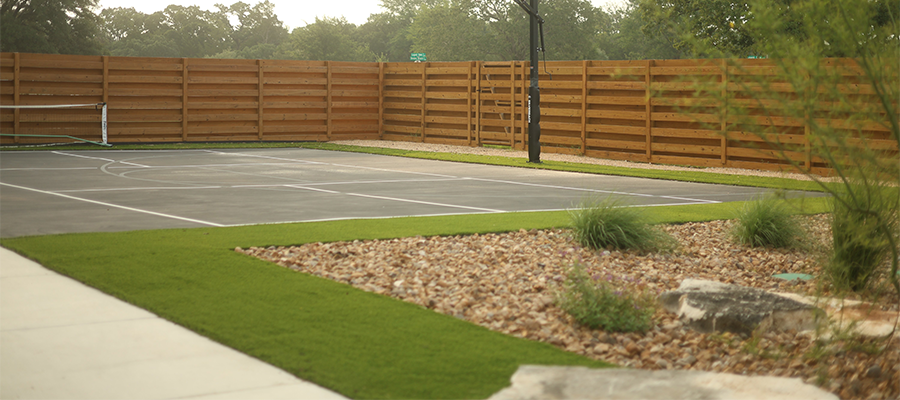
Key Principles of Xeriscaping
Xeriscaping comes from the Greek word “xeros,” meaning dry. Xeriscaping emphasizes designing a landscape that thrives on minimal water use. This is especially beneficial in Texas, where drought and water conservation are concerns. Below are the key principles of xeriscaping.
Planning and Design
Intentional design is the foundation of successful xeriscaping in Texas. Planning involves an initial assessment of the outdoor space and a knowledge of local climate conditions. Therefore, homeowners must work with a professional landscaper in their area.
Drought-Tolerant Plants
It’s essential to select native Texas or drought-resistant plants that can survive with minimal irrigation. These plants – such as Texas Sage, Blackfoot Daisy, Yuca, and Prickly Pear Cactus – are adapted to the harsh Texas climate and typically require less water and maintenance. Placing plants with similar water needs together helps ensure efficient use of water and supports the ecosystem’s natural balance.
Efficient Irrigation
While the goal of xeriscaping is to use less water in your outdoor living space, irrigation is important for strategic water use. Using water efficiently by focusing on drip irrigation systems, rainwater harvesting, or strategic watering methods helps minimize waste.
Hardscaping
Creating your sustainable lawn includes incorporating non-plant features like rocks, pathways, patios, or decorative stones that reduce areas requiring water and add visual interest.
Benefits of Xeriscaping
Whether you’re a Texas homeowner in a drought-prone area, aiming to cut your monthly water bill, dealing with poor soil quality, or looking to create an eco-friendly outdoor space, xeriscaping offers a variety of benefits.
Water Conservation
The most obvious benefit of xeriscaping is water conservation, which is a top priority in Texas’s drought conditions. Xeriscaping reduces the need for supplemental irrigation by using drought-resistant plants and efficient watering methods. By default, this also makes your outdoor living space low-maintenance compared to traditional lawns and gardens.
Adaptability to Texas Climate
Xeriscaping incorporates native and adapted plants that are well-suited to Texas’ diverse environments and weather conditions. These plants are naturally resilient to heat, pests, and periodic dry spells.
Cost Savings
Reduced water bills and lower maintenance costs make xeriscaping an economical choice for homeowners in the long term.
Environmental Impact
Xeriscaping uses sustainable design principles, which can reduce the use of fertilizers, pesticides, and other chemical treatments that may harm local ecosystems.
Aesthetic Appeal
Modern xeriscaping focuses on design, emphasizing rocks, native plants, pathways, decorative elements, and functional spaces, allowing homeowners to personalize their landscapes.
Xeriscaping in Bryan/College Station, Texas
Xeriscaping is a creative and practical landscaping solution that combines aesthetics, sustainability, and water efficiency, offering a beautiful way to design outdoor spaces while adapting to environmental challenges. At Grassroots, we have a reputation for providing detail-oriented landscape services and high-quality customer care for homeowners in Bryan/College Station, Texas. Schedule a consultation with us to learn more about xeriscaping as your next home project.